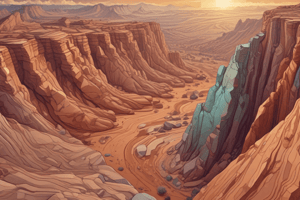Podcast
Questions and Answers
What is geology?
What is geology?
Geology is a branch of science dealing with the study of the Earth, including its origin, structure, composition, history, and natural processes.
Which of the following are major branches of geology? (Select all that apply)
Which of the following are major branches of geology? (Select all that apply)
- Economic Geology (correct)
- Biological Geology
- Environmental Geology (correct)
- Physical Geology (correct)
What does physical geology study?
What does physical geology study?
Physical geology studies the physical features and processes of the Earth and investigates how the Earth's surface and interior are shaped by natural forces.
What is the focus of historical geology?
What is the focus of historical geology?
How does environmental geology relate to human activities?
How does environmental geology relate to human activities?
What does economic geology study?
What does economic geology study?
Geology is unimportant to human society.
Geology is unimportant to human society.
Which materials related to pencils are derived from geological processes? (Select all that apply)
Which materials related to pencils are derived from geological processes? (Select all that apply)
What materials are primarily used to create the brass of a pencil?
What materials are primarily used to create the brass of a pencil?
Which of the following statements is true about the terrestrial planets?
Which of the following statements is true about the terrestrial planets?
What makes Earth unique among the planets in the solar system?
What makes Earth unique among the planets in the solar system?
Which of the following is NOT classified as a giant planet?
Which of the following is NOT classified as a giant planet?
What is the most abundant element found in the Sun and the solar system?
What is the most abundant element found in the Sun and the solar system?
Which planets belong to the terrestrial category?
Which planets belong to the terrestrial category?
What are giant planets primarily composed of?
What are giant planets primarily composed of?
How many planets are known to orbit the Sun?
How many planets are known to orbit the Sun?
Which branch of geology primarily deals with the Earth's physical features and processes?
Which branch of geology primarily deals with the Earth's physical features and processes?
What does stratigraphy primarily study?
What does stratigraphy primarily study?
Which of the following studies focuses on the natural processes affecting the Earth's surface?
Which of the following studies focuses on the natural processes affecting the Earth's surface?
Economic geology is most concerned with which aspect of geology?
Economic geology is most concerned with which aspect of geology?
Which subfield of geology investigates the physical characteristics and classifications of rocks?
Which subfield of geology investigates the physical characteristics and classifications of rocks?
What key concept does historical geology focus on regarding the Earth?
What key concept does historical geology focus on regarding the Earth?
Which field studies volcanic activity and related phenomena?
Which field studies volcanic activity and related phenomena?
Seismology primarily investigates which of the following?
Seismology primarily investigates which of the following?
What does hydrogeology primarily study?
What does hydrogeology primarily study?
Which branch of geology evaluates the impact of human activities on the Earth's systems?
Which branch of geology evaluates the impact of human activities on the Earth's systems?
What is the primary focus of petroleum geology?
What is the primary focus of petroleum geology?
Which aspect does geochemistry specifically study?
Which aspect does geochemistry specifically study?
What is one economic importance of geologists in society?
What is one economic importance of geologists in society?
Which topic falls under the domain of economic geology?
Which topic falls under the domain of economic geology?
How does geology significantly impact everyday life?
How does geology significantly impact everyday life?
Which geological branch is focused on evaluating natural hazards like landslides?
Which geological branch is focused on evaluating natural hazards like landslides?
What is the primary composition of the Earth's crust?
What is the primary composition of the Earth's crust?
What is the state of the Earth's outer core?
What is the state of the Earth's outer core?
Which layer of the Earth is the thickest?
Which layer of the Earth is the thickest?
What primarily distinguishes the mechanical layers of the Earth from compositional layers?
What primarily distinguishes the mechanical layers of the Earth from compositional layers?
Which layer directly lies beneath the Earth's crust?
Which layer directly lies beneath the Earth's crust?
What is magma when it reaches the surface of the Earth?
What is magma when it reaches the surface of the Earth?
What are the two main components of the Earth's core?
What are the two main components of the Earth's core?
What characterizes the lithosphere in terms of Earth structure?
What characterizes the lithosphere in terms of Earth structure?
What is the primary characteristic of the lithosphere?
What is the primary characteristic of the lithosphere?
What is the primary function of the asthenosphere in relation to plate tectonics?
What is the primary function of the asthenosphere in relation to plate tectonics?
Which layer of the Earth is the only one characterized as a true liquid?
Which layer of the Earth is the only one characterized as a true liquid?
How does the temperature and pressure of the mesosphere affect its rock composition?
How does the temperature and pressure of the mesosphere affect its rock composition?
What elements predominantly make up the inner core of the Earth?
What elements predominantly make up the inner core of the Earth?
What is a notable feature of the core-mantle boundary?
What is a notable feature of the core-mantle boundary?
What is the approximate thickness of the Earth's lithosphere in continental areas?
What is the approximate thickness of the Earth's lithosphere in continental areas?
Which characteristic differentiates the asthenosphere from the lithosphere?
Which characteristic differentiates the asthenosphere from the lithosphere?
Flashcards are hidden until you start studying
Study Notes
Introduction to Geology
- Geology is the branch of science dedicated to studying the Earth.
- It encompasses the Earth's origin, structure, composition, history, and the processes that shape it.
Branches of Geology
-
Physical Geology: Examines the Earth's physical features and processes, including plate tectonics, erosion, weathering, volcanism, and earthquakes.
- Geomorphology: Studies landforms and their creation.
- Mineralogy: Focuses on minerals, their structure, composition, identification, and classification.
- Petrology: Investigates rocks, their origin, composition, texture, and classification.
- Volcanology: Studies volcanoes and volcanic activity.
- Seismology: Investigates earthquakes and seismic waves.
-
Historical Geology: Studies the Earth's geological history and its life forms.
- Stratigraphy: Analyzes rock layers (strata), correlating, dating, and interpreting them.
- Paleontology: Studies fossils and ancient life.
- Geochronology: Determines the age of rocks and geological events through methods like radiometric dating.
-
Environmental Geology: Studies the interaction between human activities and the Earth's systems (atmosphere, hydrosphere, biosphere, lithosphere).
- Hydrogeology: Investigates groundwater flow, quality, quantity, and management.
- Geochemistry: Analyzes the chemical composition and reactions of Earth materials and fluids.
- Engineering Geology: Studies geological factors influencing engineering projects like dams, bridges, tunnels, and buildings.
-
Economic Geology: Studies Earth materials with economic value.
- Mining Geology: Investigates ore deposits and their exploration, mining, processing, and reclamation.
- Petroleum Geology: Studies oil and gas deposits, their exploration, drilling, production, and transportation.
- Mineral Economics: Examines supply, demand, price, and trade of mineral resources.
Importance of Geology
- Geology is crucial for discovering and utilizing natural resources like oil, gas, metals, and building materials.
- Geological engineers assess roads, buildings, and dams for geological stability and hazard potential.
- The entire human race relies on geological discoveries for its survival and well-being, as seen in the example of a pencil's components:
- Pencil brass - sourced from copper or zinc.
- Wood - shaped by machines made of iron.
- Color - paint pigment derived from various minerals.
- Pencil lead - made from lead, graphite, and clays.
Geology Overview
- Geology is the study of the Earth, its origin, structure, composition, and history, including the development of life.
- Geology is a broad field with many branches and applications.
- The Earth is the fifth largest planet in the solar system and the only one with liquid water on its surface.
- The Earth is composed of four main layers based on chemical composition: crust, mantle, outer core, and inner core.
- The Earth is also composed of five main layers based on physical characteristics: lithosphere, asthenosphere, mesosphere, outer core, and inner core.
Earth's Structure
- The crust is the Earth's outermost layer, about 70 km thick on land and 5 km thick at ocean floors.
- The mantle lies beneath the crust, about 3,000 km thick.
- The core is the Earth's innermost layer, composed of an outer core of liquid iron and nickel and an inner core of solid iron and nickel.
- The lithosphere includes the crust and the upper part of the mantle.
- The asthenosphere is the upper part of the mantle, located below the lithosphere. It is ductile and mechanically weak.
- The mesosphere is the region between the asthenosphere and the core. The rocks here are stronger and more rigid than in the asthenosphere.
- The outer core is a layer of liquid iron and nickel. It is the only truly liquid layer of the Earth.
- The inner core is the innermost part of the Earth, about 2414 km thick, and is mostly solid iron and nickel.
Composition of Pencil Components
- Pencil brass is made from copper or zinc.
- Pencil wood is shaped by machines made of iron.
- Pencil color comes from various mineral pigments in the paint.
- Pencil lead is a mixture of lead, graphite, and clays.
Studying That Suits You
Use AI to generate personalized quizzes and flashcards to suit your learning preferences.




